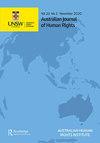促进伊斯兰家庭法与《消除对妇女一切形式歧视公约》的建设性协调:关于阿联酋对《消除对消除对妇女歧视公约》第16条以及婚姻和家庭关系平等权利的保留意见的研究
Q1 Arts and Humanities
引用次数: 1
摘要
摘要本研究的目的是通过伊斯兰家庭法与《消除对妇女一切形式歧视公约》第16条的建设性协调框架,评估阿拉伯联合酋长国对《消除对女性一切形式歧视条约》的保留。它分为两部分:第一,伊斯兰家庭法中的妇女权利,第二,阿联酋对《消除对妇女一切形式歧视公约》第16条的保留,以及婚姻和家庭关系的平等权利。研究得出的结论是,《消除对妇女歧视公约》规定的两性平等和《伊斯兰教法》的互补性原则是两个不同的概念,因为互补性包括性别差异,但平等不包括。根据该研究,这两个概念都有助于确定协调领域,因为包括阿联酋在内的大多数阿拉伯国家都颁布或修订了法律,以符合包括《消除对妇女一切形式歧视公约》在内的人权条约的方式解释伊斯兰教。因此,阿联酋可能无法维持其对《消除对妇女一切形式歧视公约》的大部分保留,包括第16条。本文章由计算机程序翻译,如有差异,请以英文原文为准。
Toward constructive harmonisation of Islamic family law and CEDAW: a study on the UAE’s reservation to CEDAW Article 16 and equal rights to marriage and family relations
ABSTRACT The purpose of this study is to provide an evaluation of the United Arab Emirates’ (UAE) reservations to the Convention on the Elimination of All Forms of Discrimination against Women’s (CEDAW) Article 16 through the frame of constructive harmonisation between Islamic family law and CEDAW. It has been divided into two sections: firstly, women’s rights in Islamic family law, and secondly, the UAE’s reservation to CEDAW Article 16 and equal rights to marriage and family relations. The study concluded that gender equality under CEDAW and the complementarity principle of Shari’ah are two different concepts, since complementarity includes gender differences, but equality does not. According to the study, both concepts can be helpful in identifying areas of harmonisation since most Arab countries, including UAE, have enacted or amended laws that interpret Shari’ah in a way that is compatible with Human rights treaties, including CEDAW. As a result, the UAE may not be able to maintain most of its CEDAW reservations, including Article 16.
求助全文
通过发布文献求助,成功后即可免费获取论文全文。
去求助
来源期刊

Australian Journal of Human Rights
Arts and Humanities-History
CiteScore
1.30
自引率
0.00%
发文量
43
期刊介绍:
The Australian Journal of Human Rights (AJHR) is Australia’s first peer reviewed journal devoted exclusively to human rights development in Australia, the Asia-Pacific region and internationally. The journal aims to raise awareness of human rights issues in Australia and the Asia-Pacific region by providing a forum for scholarship and discussion. The AJHR examines legal aspects of human rights, along with associated philosophical, historical, economic and political considerations, across a range of issues, including aboriginal ownership of land, racial discrimination and vilification, human rights in the criminal justice system, children’s rights, homelessness, immigration, asylum and detention, corporate accountability, disability standards and free speech.
 求助内容:
求助内容: 应助结果提醒方式:
应助结果提醒方式:


